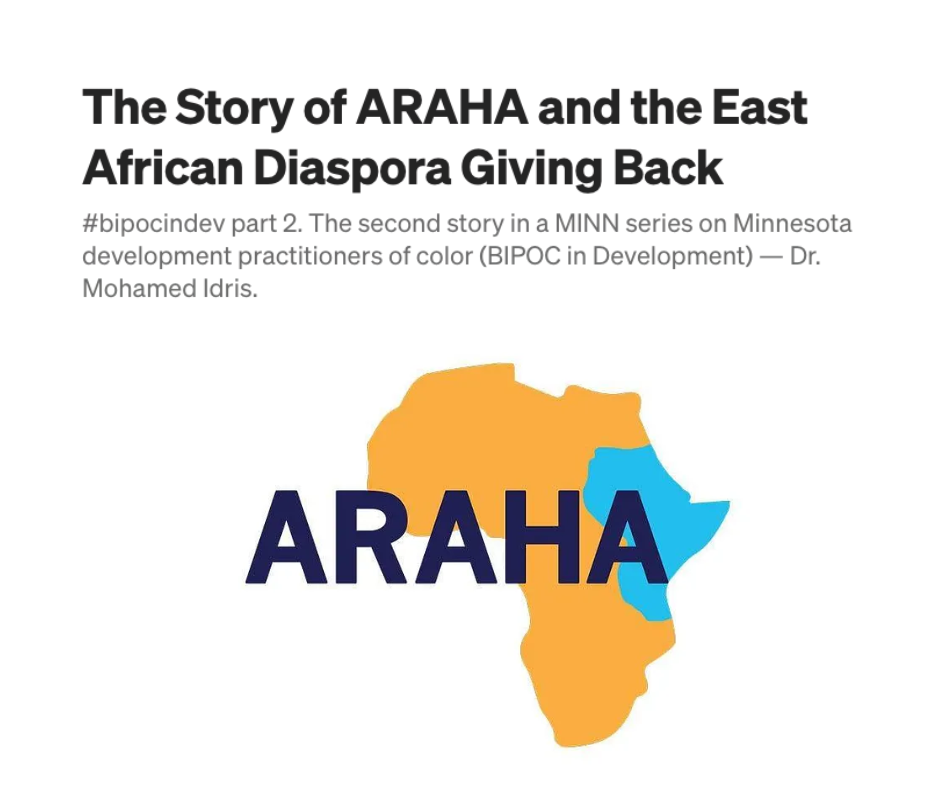Bridging Cultures and Creating Connections: Lolla's Journey in Diaspora Development
“I see my work as a bridge, as a connector, as a way to open people’s minds and hearts and shift institutions from within to create more understanding.”
As the world continues to evolve, the need for inclusivity and cultural understanding in international development has never been more critical. Lolla Nur, an Afro-Arab Muslim with a deep commitment to bridging cultural divides, has spent her career advocating for a more nuanced approach to development work.
Lolla’s interest in international development began during her college years. “I was taking various classes on political economy, international relations, and development,.” These academic explorations led her to conduct research as a Ronald E. McNair Scholar, where she analyzed how terms like “corruption” were used differently in reference to OECD countries compared to regions like Africa and the Arab world. “I was trying to understand, through narrative analysis, how corruption was discussed in these institutional publications and policy documents about these regions of the world.” Lolla was taken aback by the stark contrast in how these regions were portrayed in development discourse.
Lolla’s research continued with her MINN fellowship where she explored the intersections of faith, identity, culture, and development. One of her most memorable interviews was with Dr. Mohamed Idris, the Executive Director of ARAHA, a nonprofit that supports the Horn of Africa. “I thought Dr. Idris presented some cogent insights about the challenges in the development sector and some of the barriers and biases, as well as the incredible opportunities! He’s a great example of someone doing really good work while rooted in his identity and building bridges with mainstream institutions and local and federal government.”
A Personal Calling to Bridge Divides
Lolla’s interest in development is deeply personal. Growing up as the daughter of Afro-Arab Muslim parents who served the US government abroad, she saw firsthand the complexities of navigating cultural and political tensions. Reflecting on her experiences post-9/11, she shared, “I think these generalizations have been harmful. Likewise, in these communities, we (my family) were criticized for still being connected to the American community after 9/11. It seemed in Muslim communities abroad, for a time, there was almost a boycott of everything American.” Despite these challenges, Lolla and her family continued their work, standing up for unity and understanding.
The key to effective development is integrating cultural context and avoiding harmful generalizations. “I just think it’s important that when development or any type of foreign policy work is done, that local cultural contexts are incorporated and integrated,” she explained.
In 2017, Lolla co-founded the East Africa Diaspora Artists Initiative (EADAI) in response to the political climate surrounding the refugee ban. As an artist and activist, Lolla recognized the need for a platform to reclaim the narrative of East African and Afro-Arab communities. “At the time, I was a practicing artist and involved in the arts-activism world. I thought it would be good to create an East African and Afro-Arab led space to reclaim the beauty of this region’s diversity.”
EADAI was founded on grassroots principles and quickly became a space for cultural expression and connection. “We were able to, within weeks, pull off a sold-out public community event at the Loft Literary Center: a panel and artists showcase on reclaiming what it means to be an immigrant from the Arab and African diasporas, and talking about the complexities of the African and Arab experience in the US.” Lolla’s work with EADAI culminated in another historic event at the Minneapolis Institute of Art (MIA), marking the first-ever presentation of East African and Afro-Arab artists at the institution. “It was historic for them as a mainstream organization that had, in the past, been criticized for othering and excluding our communities.”
This initiative exemplified her broader vision of creating spaces for dialogue, healing, and connection: “I see my work as a bridge, as a connector, as a way to open people’s minds and hearts and shift institutions from within to create more understanding.”
Looking into the future, her commitment to diaspora development, cultural equity, and building connections across communities remains strong. She continues to challenge the rigid categories that often define and limit how we view identity and development. As she reflects on the ongoing work to create a more inclusive world, Lolla believes that, “People make and enact policy. And all people, regardless of background, seek healing, understanding, and connection.”
Her work is a powerful reminder that true progress in development comes when we embrace complexity, respect diversity, and recognize the shared humanity that binds us all.
Read more about Lolla's work here.
The MINN Fellowship program seeks to foster diverse viewpoints within the Minnesota International NGO Network (MINN), provide professional enrichment, pursue networking opportunities, build long-lasting relationships between traditionally underrepresented communities and MINN, and elevate voices within MINN and the international development community in Minnesota. To learn more about how the MINN Fellowship program is supporting innovative leaders like Lolla, click here.
Donate to support our programs and help foster diverse leadership in international development.


